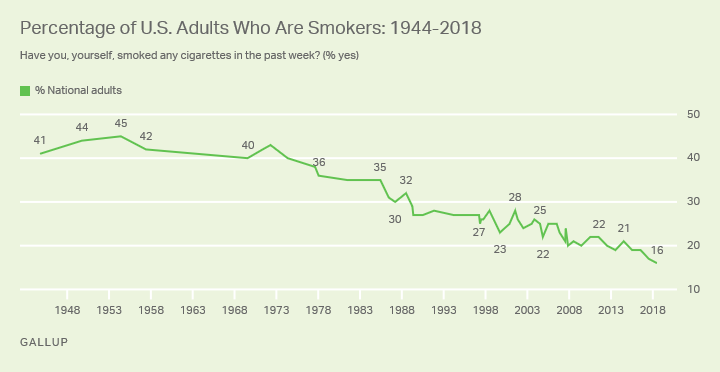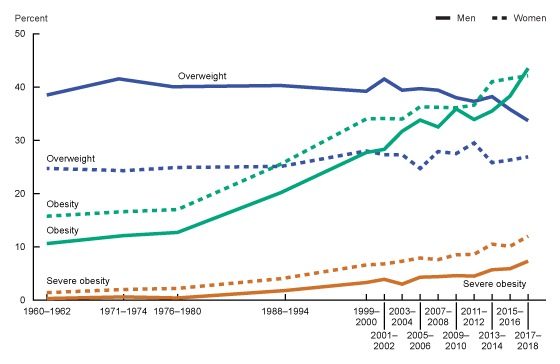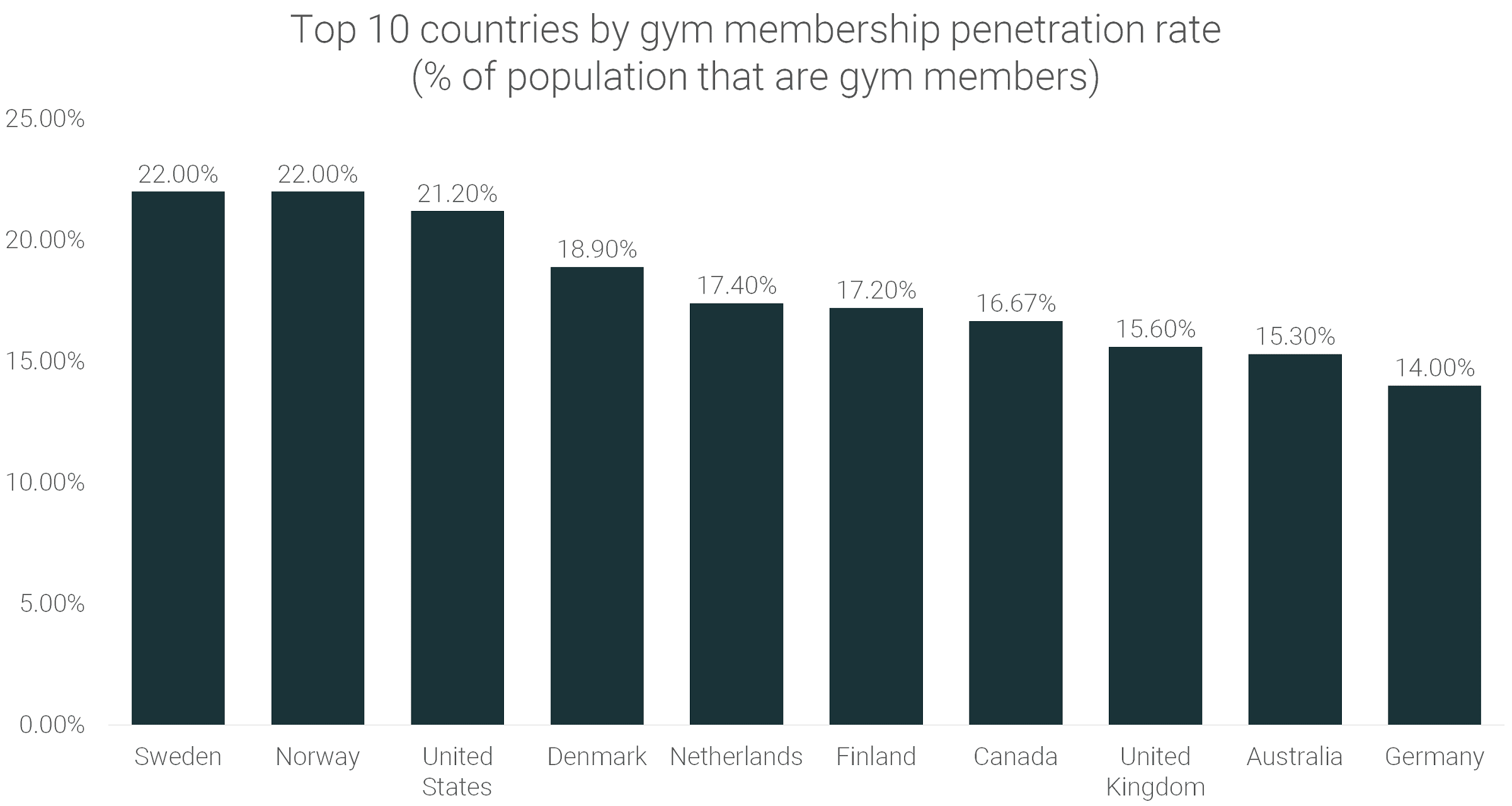I don’t think the war on obesity is winnable, unlike efforts to prevent smoking. As much as the inner libertarian in me may protest, one can make an argument that government efforts to reduce smoking, such as those cringy anti-smoking ads [funded by tobacco litigation] and easily-ignored surgeon general warnings, have worked:

This is a public health success story. But the same cannot be said for obesity. In spite of social stigma [smoking used to be cool, but not so much anymore; obesity has/will never be seen as cool, ‘fat acceptance’ not withstanding], shrinkflation, a multi-billion-dollar health and fitness industry, more gyms, healthier school lunches, and more awareness about the negative heath effects of obesity, people just keep getting fatter:

Shrinkflation can be thought of as a tax on food, sorta like cigarette taxes, but obesity rates keep going up. The health and fitness industries are worth billions of dollars, with piss poor results to show for it. There are thousands of fitness influencers on Instagram and other social media shilling their coaching and diet programs. There are more ways now than ever before for people to exercise, to get diet and fitness advice. U.S. gym and health club attendance keeps climbing, and yet nothing seems to work:

The U.S. also ranks among the highest in the world in gym memberships relative to population:

First, I think part of what is happening is food is providing meaning to peoples lives that would other wise be empty, and Covid had made this worse. I think it is as much of an obesity crisis as it is a existential crisis, or a crisis of meaning. Many people’s lives are so empty mentally that they have to fill this void physically with food.
Second, even if more people are exercising, that still leaves a lot of people who are sedentary. Sure, diet and fitness influencers have millions of followers online, and diet and fitness conventions draw thousands of attendees, but America has 330+ million people. As popular as fitness culture is, it only represents a small slice of the overall population. There are millions of couch potatoes everywhere, and although obese people take up a lot of space in real life, are otherwise invisible online. So seeing the popularity of the likes of David Goggins and other fitness influencers, may lead one to overestimate the popularity of those activities relative to the general population: it’s really just a highly visible minority online.
Also, it’s easier to establish a causal link between premature smoking death, versus premature obesity death. If a relative or friend who is a lifelong pack-a-day smoker dies (and very painfully) from COPD or lung cancer, that’s a much stronger form of social proof to not smoke, than that same person who is obese dying at 60 from a heart attack or stroke (because plenty of non-obese people also die from those conditions). In the 50s and 60s, when smoking was much more common, the probability of knowing someone who died prematurely of COPD or lung cancer due to smoking approached unity, so that was a wake-up call to quit that could have possibly overridden the biology of addiction, at least for enough people to quit that smoking rates have plunged over the past half century. [But the same math also shows that as smoking rates fall, then the probability of knowing someone who dies prematurely falls exponentially.]
Third, genes play a major role. I think there’s strong a correlation between poor diets, lack of exercise, and low/average IQs. It is part of the same cluster of poor health and lifestyle choices that affect low/average IQ people, such as obesity, sleep apnea, bad teeth, diabetes, being in poor physical shape, etc.
I have observed that on reddit subs devoted to fitness or some other physical activity, that the best performers (as in having the best endurance, the strongest, etc.) are almost all high IQ. I have also observed that high IQ people are also more likely to be grouped into one of three categories: either being really strong physically (like weightlifting), having very good cardio ability (like running), or are just average/overweight, whereas average IQ people tend to almost always cluster in the ‘average/overweight’ category, being neither strong or having good endurance. This suggests that there may be some genetic link between physical fitness and IQ, which is not intuitively obvious but is demonstrated empirically.
It is indeed possible for two seemingly unrelated traits have a genetic link. For example: a gene that allows some people to require as little as 4 hours of sleep a night, also confers increased pain tolerance even though these seem unrelated. Thus fighting obesity may be tantamount to raising IQs, which is not good news due to the well-established imperviousness of IQ to efforts to raise it (and there is evidence that global IQs may be falling).
Making matters worse is that people, particularly males who are overweight or obese, will find exercise (anything cardio related especially), to be difficult and progress slow, if any progress at all, so it’s hard to get into a habit of doing something and not be discouraged when your ability is so poor to begin with. People with good genetics for exercise are more likely to see progress and enjoy exercise, and thus maintain it as a habit. [Obese or overweight males may have an advantage at weightlifting, but this does not burn as many calories as cardio.]
In case I haven’t made it abundantly clear, genes play a huge role regarding physical ability, just as much as intelligence is also innate. Regarding physical ability, there are four key variables, each of them, I would posit, as being highly innate:
1. Your baseline ability, which is before training. Bigger, taller people will generally have a greater baseline ability for weightlifting. Short, thin people may have an advantage at long-distance running. This is obviously innate; you cannot make yourself taller or shorter.
I remember in high school PE some kids were unable to run a mile without stopping multiple times or walking half the way. It’s not as if they were overweight or sick in any obvious way, but they simply lacked the stamina to do it. Others could do it very fast. It’s not like the good runners had 10,000 hours of practice that could explain their ability. Same for pullups–huge variation in ability (the kids who sucked at running generally sucked at pullups too). That’s pure genetics.
2. How well you respond to training. This is also highly innate and crucial, because people who respond poorly are more likely to get discouraged and quit. Some people will see considerable improvement with training, going from being totally out of shape to running half marathons at a decent time, and some will see much less or no progress. Some people can work out and add hundreds of pounds to their major lifts, and others cannot add much at all.
Regarding my high school again, the kids who sucked at running did not get better. David Goggins, who says he went from being 297lbs and unable to run a quarter of a mile, to now running ultra-marathons, is someone who responded very well to training. It’s not uncommon to read stories of people who run 5-10 miles as a daily routine, and they attribute their health to it, but you don’t see all the stories of people who struggle to run even just 1 mile/day and never got any better. No one is going to post on their social media that they struggle to run a single mile.
3. How well you respond to PEDs (for people who want to take their training and abilities to the next level, such as bodybuilders or pro strength athletes). Some people gain much more muscle mass, endurance, strength, etc. with PEDs than others.
4. How well you tolerate PEDs. This determines how long of a career you have or how much your body can take before succumbing to various side effects, although this only applies to a very small subset of the general population, who will take PEDs for a long period of time and compete professionally.
I don’t understand why so many people, usually on the ‘right’, who subscribe to HBD as it pertains to IQ or other attributes, HBD does not apply to weight. It’s like IQ is considered, correctly, to be innate and unchanging at an individual level, but obesity is somehow a function of purely environmental factors (like diet, exercise, and willpower). But to say obesity is not genetic owing to willpower or starvation diets, is like saying that IQ is not innate because it’s possible to lower one’s IQ through blunt head trauma.
Even bariatric surgery is of limited efficacy at making obese people thinner long-term (in the short-term it produces dramatic weight loss, but despite such drastic measures as making the small intestine shorter and the stomach much smaller, the weight still finds its way back). A study of “Biggest Loser” contestants showed that they all regained significant weight despite their best efforts to keep it off, showing how no amount of willpower, in the end, can override genes.
Indeed, 98% of people who diet will regain the weight (and maybe even more), but those who succeed tend to talk about it, so we can expect to hear more diet success stories than predicted by statistics alone (and there’s probably also an IQ correlation, too, to dieting success, with smarter people having more success).
The above and other factors, has led me to believe that obesity or being borderline obese is somehow biologically optimum or normal. I think all the BMI guides will eventually have to be revised to make 27-30 as ‘normal’. Even people with BMIs of 30-35 do not lose much in terms of life expectancy, so I think this lends credence to the biological optimum argument, or at least that humans are genetically predisposed to carrying a lot of fat even if they want to lose weight, and that nothing short of turning back the dial to the 1800s will change this unless there is some breakthrough drug that can make people thinner without much effort, which in spite of billons of dollars of potential profit from such a drug, to say progress has been slow is an understatement.
Tigers and Lions are biologically optimized to kill. Cheetahs are optimized for speed, and humans are optimized for carrying fat. Being neither particularly strong or fast, that is what humans do best (and I guess also arguing about politics online). I don’t think it’s possible to overstate the propensity of humans to carry fat. For example, Freddie deBoer wrote that in order to get his weight down to 172 on his six-foot-one frame (which is considered to be a healthy BMI of 22.7), he had to cut his intake to just 1,000 calories/day, which is compensate with prisoner of war rations. That’s just crazy and obviously not sustainable, and of course it wasn’t, and he went back above 240 or so, which is his baseline, not through any effort on his part to overeat. Even people who appear outwardly thin can still carry a lot of body fat (the so-called ‘skinny fat’ syndrome).
How about government solutions, like, hypothetically, forbidding bad foods or huge taxes? The problem is that bad food (and probably also Netflix) may be the only respite for people’s otherwise empty lives, and obesity is the price to pay to prevent mass unrest or mass psychosis. Violent crime has fallen worldwide since the early 90s as people have gotten fatter, so perhaps there is something to this.
If infective weight loss solutions are worth billions, imagine how much an actually effective pill-like treatment for obesity will be worth. Here you have a problem in which half the world’s population is your potential customer base; if that is not an economic incentive, I don’t know what is. But at the same time, given how existing measures and efforts have so utterly failed, does not make me optimistic (at least not in the short-term).
It sucks how so many things in life are ‘fixed’. We want to believe we have the ability to dramatically change our lives through willpower alone, and although some can, many cannot, and it’s through no fault of their own that they can’t. And that’s fine. Let’s root for technological progress that will allow people who have cruddy genes to enjoy then benefits of those who have good genes (although relative disparities will always exist), and let’s provide economic incentives for smart, inventive people to develop such technologies instead of making people’s lives worse with regulation of something that is largely outside of one’s control.
Any statistics that control for race/genetics?
Do white in the U.S have higher BMI’s than white Europeans?
Do asians in the U.S have higher BMI’s than asians in Asia?
Great article, you should write for some major publications opinion section. I know you don’t want to be restricted by what you can write and many of your articles wouldn’t pass the filter of many news sites, but maybe just write something kosher for them to draw more readers to your blog.
Deltacron of the Coronavirus seems most effective in dealing with this phenomenon.
Outside of restricting sugar and simple carbs that is.
What are your thoughts of the efficacy of the Ketogenic Diet combined with Intermittent fasting on Obesity?